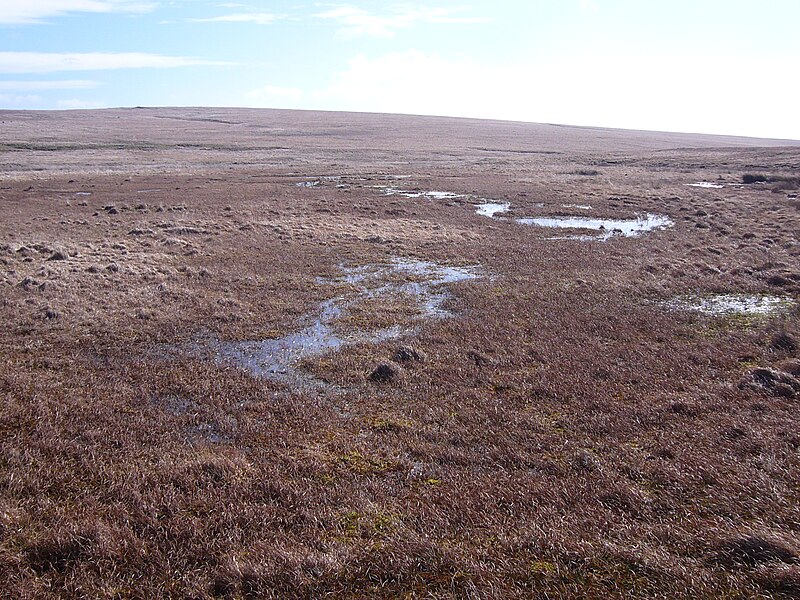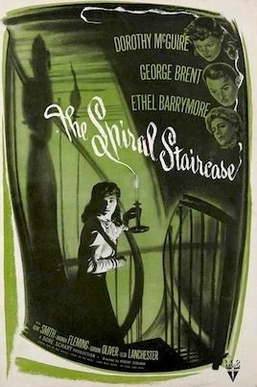.

"I say, Watson," said the baronet, "what would Holmes say to this? How about that hour of darkness in which the power of evil is exalted?"
As if in answer to his words there rose suddenly out of the vast gloom of the moor that strange cry which I had already heard upon the borders of the great Grimpen Mire. It came with the wind through the silence of the night, a long, deep mutter then a rising howl, and then the sad moan in which it died away. Again and again it sounded, the whole air throbbing with it, strident, wild, and menacing. The baronet caught my sleeve and his face glimmered white through the darkness.
"My God, what's that, Watson?"
"I don't know. It's a sound they have on the moor. I heard it once before."
It died away, and an absolute silence closed in upon us. We stood straining our ears, but nothing came.
"Watson," said the baronet, "it was the cry of a hound." -- Arthur Conan Doyle, The Hound of the Baskervilles (1901)
In his last years Johnson meticulously recorded in fine detail his multiple physical and mental symptoms, noting everything down, the more intimately personal entries inscribed in Latin. His troubled nights are often the subject.
He suffered from gout and asthma, and too from dropsy (edema), for which he consumed squills, a diuretic herb, to relieve the discomfort caused by fluid retention. He also self-medicated with diacodium, a syrup extracted from opium poppies. Still sleep often eluded him. Sometimes he sat up in a chair, his body in pain, his mind restless and unsettled. On the night of July 26, 1784, struggling through the last summer of his life, he noted the presence of a "tristitia gravissima," or terrible sadness, weighing him down awfully.

Johnson was vexed by serious circulatory problems. A year earlier he had been afflicted by a stroke. For a few days he had lost the ability to speak, a grave development for man so involved with language. In this fragile period he had committed to paper some private thoughts, in this case writing in English.
The black dog I hope always to resist, and in time to drive, though I am deprived of almost all those that used to help me. The neighbourhood is impoverished. I had once Richardson and Lawrence in my reach. Mrs. Allen is dead. My house has lost Levet, a man who took interest in everything, and therefore ready at conversation. Mrs. Williams is so weak that she can be a companion no longer. When I rise my breakfast is solitary, the black dog waits to share it, from breakfast to dinner he continues barking, except that Dr. Brocklesby for a little keeps him at a distance. Dinner with a sick woman you may venture to suppose not much better than solitary. After dinner, what remains but to count the clock, and hope for that sleep which I can scarce expect. Night comes at last, and some hours of restlessness and confusion bring me again to a day of solitude. What shall exclude the black dog from an habitation like this?
In traditional British folklore the nocturnal apparition of a large, silent, diabolical-seeming black dog, with great glowing eyes, was commonly regarded as a portent of death. The sites of electrical storms, lonely crossroads, scaffolds where public executions had taken place, ancient roads and pathways, and above all boggy moors and mires, were thought to be its preternaturally-designated haunts and precincts.
The luminous, ghastly and spectral black hound reported to be roaming the boggy mires of Dartmoor in Arthur Conan Doyle's fiction of Sherlock Holmes was a descendant of this ominous creature of folk legend.
As a child I was terrified by certain movies. The films I remember most vividly from my childhood were memorable to me for exactly that reason. In the darkness of the theatre I was subject to secret and nameless terrors which I dared confess to no one.
One of these films was The Thing from Another World. Another was The Spiral Staircase. A third was The Hound of the Baskervilles. Each in its way a black dog film. A malevolent plant-based alien being from outer space had landed in the polar ice. A person or thing I did not understand was lurking in the shadows beneath the stairs. A great black dog with glowing eyes was prowling a mysterious place called the moors, periodically uttering blood-curdling howls. It remained unseen but was known by the baying cries that heralded its approach as it came to exact the wrath of the night. This terrible moaning was a message from beyond the borders of the day world, so piercing as to almost awaken the dead (whoever and wherever they were).
I was not quite sure who or what or where The Baskervilles were, but was afraid to ask. In my youthful imagination the shadowy back rows of the moviehouse were populated by unidentifiable lumps, possibly horrible mutated fur-covered black basketballs sent here from the other side.
As the crowd slowly filtered out of the theatre I realized daylight had gone. C'était une nuit orageuse et sombre. Rain was beginning to fall.
"...there stood a foul thing, a great, black beast, shaped like a hound, yet larger than any hound that ever mortal eye has rested upon. And even as they looked the thing tore the throat out of Hugo Baskerville, on which, as it turned its blazing eyes and dripping jaws upon them, the three shrieked with fear and rode for dear life, still screaming, across the moor. One, it is said, died that very night of what he had seen, and the other twain were but broken men for the rest of their days."
Hunters in the Snow: Pieter Breugel the Elder, 1565, (Kunsthistorisches Museum, Vienna)
Samuel Johnson: James Barry, date unknown (National Portrait Gallery, London)
Johnson diary page facsimile, July 26, 1784: from the Donald & Mary Hyde Collection of Dr. Samuel Johnson, Houghton Library, Harvard
Aune Head Mire, source of the River Avon, South Dartmoor: photo by Herby, 2008
The Spiral Staircase, directed by Robert Siodmak, RKO Pictures, 1946: film poster
The Hound of the Baskervilles, directed by Sidney Lanfield, Twentieth Century Fox, 1939: DVD cover (image by Zanimum, 2004)





amazing post..
ReplyDeleteutterly great.
Thank you Lanny.
ReplyDeleteWith this one I juggled the ducks around, shot down and/or drowned some others... till about a quarter after exhausted insanity, so the good word is fortifying (a relief).
There is nothing beats the approval of a master.
i think i would like to read 'diary' if i were samuel i would ask the black dog's paw already.
ReplyDeleteahhh... and just imagine me in the middle of the night reading this post...
ReplyDeletenowadays in our country... we are seeing lots of these black dogs and creatures... real ones!
for the pain in my heart
ReplyDeleteto become
the black dog
or to wrestle with it
fur soft comfort beneath the hand
warmed by the hot breath
of mortality
i fear only being abandoned
by death.
Hauntingly good, Tom. I started reading just before the sun came up and thankfully the light was shining on the snowy trees outside my window by the time I reached the end.
ReplyDeletegamefaced,
ReplyDeleteYes, absolutely, that would be the best approach. (A gentle request that would probably work at least as well as if not better than "Sit!" or "Heel!" or other available commands.)
hb, I do think of and imagine you in that perilous situation, with the black dogs nipping at your heels.
Namaste.
Zev,
I fear only being abandoned at the hour of death.
Otto,
Thank you, I am moved.
Here, at this hour, I remain in the dark ... imagining one of those Hunters in the Snow as you.
(Maybe it's the Teutonic pseudonym.)